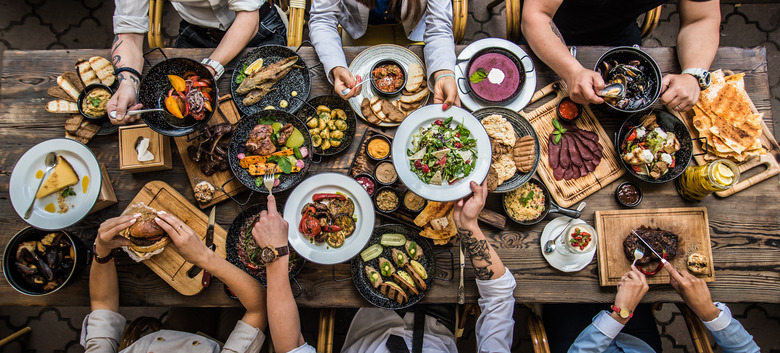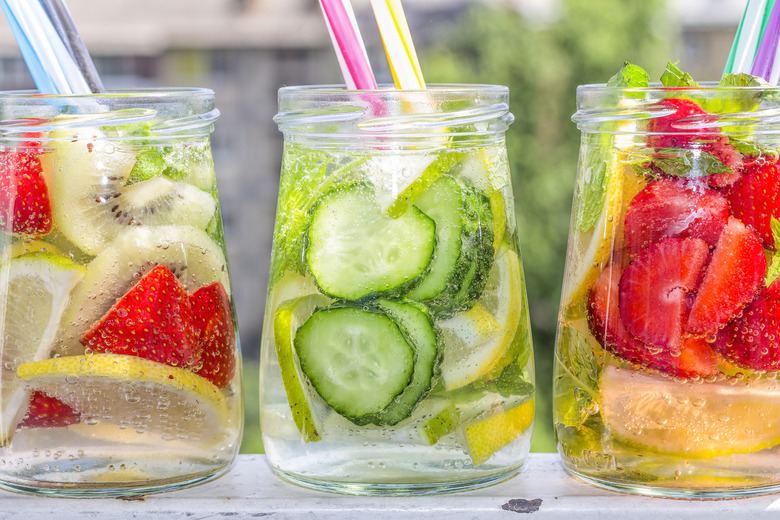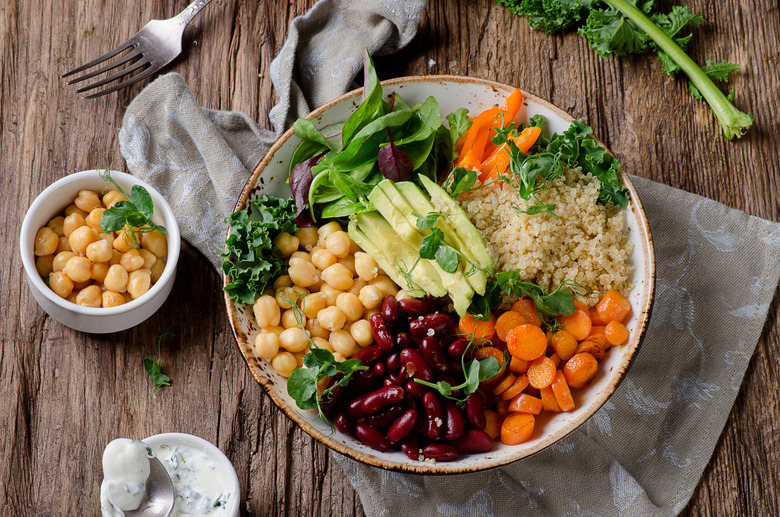12 Ways To Get Back On Track After Holiday Overeating
You overindulge on Thanksgiving and then vow not to do the same on Christmas. Then Christmas comes and the pies and cookies and peppermint-sprinkled cupcakes are too delicious-looking to resist. Then, a week later, it's New Year's Eve, and you have a few too many glasses of Champagne. And it's OK to enjoy all these things. It's healthy to not be so restrictive with your diet that you can't enjoy yourself.
This year, to start the new year with a healthy mindset and mind, set small goals for yourself and stop eating foods that are bad for you. Getting back on track and finding balance after so many big meals and nights of imbibing isn't a race. Start with some simple changes.
Don’t go cold turkey off sweets
One of the biggest mistakes people make is completely cutting off their sugar intake. Sugar is a sweet form of a carbohydrate that has short-term addictive qualities. Because of this, your body craves it, and it can lead to the habit of consuming it in excess. The less you eat it, the less your taste buds will look for it. If it's really hard to curb your craving, try eating a high-fiber fruit, which is full of natural sugars. The fiber will keep you fuller longer too.
Enjoy indulgences in moderation
Moderation is key to sticking with dietary changes. Allow yourself a cookie if you've eaten well all day. What is eating well? Making sure you have incorporated the three macronutrients into your meals and snacks. Macronutrients are proteins, fats and carbohydrates. So if you had blueberry oatmeal for breakfast; an apple with peanut butter for a snack; spinach, grilled chicken, cranberries and walnuts for lunch; and brown rice, salmon and Brussels sprouts for dinner, eat a cookie. It's healthy to reward yourself, and it prevents feelings of deprivation.
Keep track of your water intake
Water is essential every day. Many of us — especially older adults — don't drink enough water, according to Harvard Medical School. A general rule of thumb is to drink four to six cups per day. If you are training for a marathon or otherwise participate in intense workouts, you should be drinking more. Water works to cushion your joints, regulate your temperature and encourage regular bowel movements.
Infuse your water with antioxidants
If you're not a water drinker, or you generally prefer more flavor, add citruses and fruits to your next glass. Oranges, frozen blueberries and strawberry slices are delicious ways to naturally sweeten your water. The vitamins and minerals in these antioxidant-rich foods also work to reduce free radical damage to your body.
Go to the grocery store with a list
Make sure to sit down before you head to the store and make a list of what you need. An easy way to do this is by thinking about which types of meals you'd like to cook that week. Because it's so easy to walk into the grocery store and pick up the glazed doughnuts, chocolate mousse cups or strawberry parfaits, sticking to a list will help you tackle cravings. This is also a great way to cut down on your grocery bill. Go right to the produce section and pick up the carrots and onions for your next slow-cooker stew.
Incorporate vitamin-rich foods into your meals
Vitamins — and minerals for that matter — are essential to your diet because they perform roles such as strengthening healthy nerves, helping your body resist infection and repairing damaged cells. Nutrient-dense foods are foods that have many of the essential vitamins and minerals your body needs to function properly. The more varied your diet is, the more likely you are to be including these important nutrients. An easy rule of thumb to follow: keep your plate colorful. Incorporate different fruits and vegetables in each meal, and change up the types of protein and complex carbohydrates (grains, pastas, rices and oats) you eat.
Try to be active for 30 minutes a day
Being active can be as rigorous as a full-body workout with weights or as simple as taking the stairs instead of the elevator. Physical activity lowers blood pressure, boosts "good" cholesterol and promotes a steady circulation of mood-boosting hormones like dopamine and serotonin, which stimulate memory and motor-system function and aid in digestion, respectively.
Don’t try fad diets, and don’t count calories
Yo-yo dieting is the cycle of losing weight on one diet, stopping the diet, gaining the weight back and then starting a new diet. Fad diets contribute to speedy weight loss that is difficult to maintain. Examples of fad diets include those that involve cutting carbs completely from your meals, only focusing on eating certain foods like one grapefruit per day or those that involve a tea or juice cleanse. Instead, use the basis of those diets to help shape sustainable diets. Focus on how many nutrients you're ingesting rather than how many calories. Instead of a waffle with a strawberry glaze topping, cut the processed carbs out and try a complex carb like steel-cut oatmeal with fresh strawberries.
Limit your alcohol consumption
Like any food, alcohol should be enjoyed in moderation. It is high in calories and low in nutritional density. While one glass of red wine might help prevent cholesterol buildup, a whole bottle will not. Through continued, excessive use, alcohol can lead to higher blood pressure and kidney and liver damage.
Set weekly goals for yourself
Setting weekly goals is sort of like going to the grocery store with a list. They are easier to follow, and you can build on each goal once you've accomplished it. Start small with something like replacing one processed snack option with a whole-food option like carrots and homemade hummus. The next week, make a plan to go for a walk every other day and continue eating your one healthy snack per day.
Start a food log
Making a food log is a good way to hold yourself accountable and to check the progress you've made. While a paper and pen work just fine, there are also apps you can download. All it takes is noting everything you ate that day from breakfast to lunch to snacks to dinner and dessert. Then write a sentence or two about how you felt that day. Did you feel bloated? Think about what foods might have made you feel that way. Did you feel energetic? What meal had the most nutrients to boost your energy levels?
Don’t beat yourself up
If you slip up and eat too much on a night out or you don't have time to cook at night so you need something quick like fast food, that's OK. Being gentle on yourself with your goals will allow you to think of a setback as less of a failure and as more of an obstacle. Just try again tomorrow. Overindulging one day doesn't mean your whole plan of getting back on track has been a waste. It's OK to treat yourself for doing well once in a while, and it'll make it easier to slowly do away with unhealthy habits.
More from The Daily Meal
The Healthiest and Unhealthiest Frozen Dinners
How to Cut Your Grocery Bill in Half












